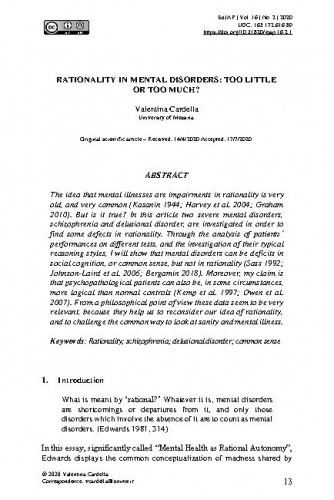The idea that mental illnesses are impairments in rationality is very old, and very common (Kasanin 1944; Harvey et al. 2004; Graham 2010). But is it true? In this article two severe mental disorders, schizophrenia and delusional disorder, are investigated in order to find some defects in rationality. Through the analysis of patients’ performances on different tests, and the investigation of their typical reasoning styles, I will show that mental disorders can be deficits in social cognition, or common sense, but not in rationality (Sass 1992; Johnson-Laird et al. 2006; Bergamin 2018). Moreover, my claim is that psychopathological patients can also be, in some circumstances, more logical than normal controls (Kemp et al. 1997; Owen et al. 2007). From a philosophical point of view these data seem to be very relevant, because they help us to reconsider our idea of rationality, and to challenge the common way to look at sanity and mental illness.; Ideja da su mentalne bolesti poremećaji racionalnosti vrlo je stara i uobičajena (Kasanin 1944; Harvey et al. 2004; Graham 2010). No je li istinita? Ovaj članak razmatra dvije ozbiljne mentalne bolesti, shizofreniju i poremećaj deluzije, s ciljem utvrđivanja grešaka u racionalnosti. Analizom uspjeha pacijenata na različitim testovima i razmatranjem njihovog tipičnog načina zaključivanja, pokazat ću da mentalne bolesti možemo smatrati manjkavostima socijalnog spoznavanja ili zdravog razuma, ali ne i racionalnosti (Sass 1992; Johnson-Laird et al. 2006; Bergamin 2018). Nadalje, tvrdim da pacijenti u psihopatološkim stanjima u određenim okolnostima pokazuju viši stupanj logičkog zaključivanja od kontrolne skupine (Kemp et al. 1997; Owen et al. 2007). Filozofski gledano, ovi relevantni podaci mogu nam pomoći u preispitivanju same ideje racionalnosti i uobičajenog shvaćanja duševnog zdravlja i mentalnih bolesti.
Sažetak

 European journal of analytic philosophy : 16,2(2020) / editor-in-chief Marko Jurjako.
European journal of analytic philosophy : 16,2(2020) / editor-in-chief Marko Jurjako.